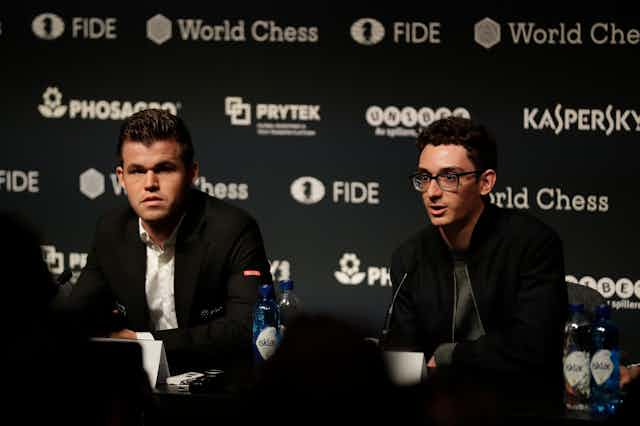If Fabiano Caruana wins the World Chess Championship match against champion Magnus Carlsen this month, he will be the first American to hold the championship title since Bobby Fischer won it in 1972. The match between Caruana, age 26, and Carlsen, age 27, of Norway, takes place in London, England, from Nov. 9 to 28.
The winner will take home about US$700,000 – or 50 percent more than the loser.
Here are five myths and unknowns about the world chess championship contenders and the game of chess.
1. Parents name their babies after chess champions
When Woman Grandmaster Jennifer Shahade and her husband, Daniel Meirom, learned that they were having a son, she told her father that she would name the baby either Fabiano or Magnus. “It started as a joke and then we realized how much we loved it,” Shahade told The Conversation. Shahade’s son Fabian was born in January 2017, before Fabiano Caruana became the challenger for the World Chess Championship but after Shahade had admired Caruana’s 7-0 win and sportsmanlike attitude in the 2014 Sinquefield Cup.
Other parents may have had the same idea. According to the Social Security Administration, the name “Magnus” first made the list of the top 1,000 baby names in the United States in 2013, the same year that Magnus Carlsen became world chess champion. It will be interesting to see if the name “Fabian” – or “Fabiano” – experiences a surge if Caruana wins the match and becomes the World Chess Champion.
Status: Unknown.
2. Chess is not a sport
People may not think that it requires much stamina to move chess pieces and pawns from one square to another. However, as mentioned in my 2006 book “Children and Chess: A Guide for Educators,” chess players sitting at the board experience a quickened heartbeat and higher blood pressure, similar to what athletes experience when they compete in their sports.
Many, if not most, chess players view chess as a sport and approach it as such. For instance, the 2018 U.S. Open chess champion Timur Gareyev – a grandmaster known for playing numerous players at once while blindfolded – has promoted the benefits of exercise for chess players.
Carlsen and Caruana stay in top physical shape to meet the demands of chess. Carlsen plays soccer, basketball and tennis and also enjoys hiking and skiing. Caruana also plays basketball and soccer and partakes in indoor rock climbing.
Status: Myth.
3. You need 10,000 hours of practice to be a chess master
The 10,000 hour rule has been popularized by books such as Malcolm Gladwell’s “Outliers: The Story of Success.” However, according to “The Psychology of Chess,” a new book by University of Liverpool psychology professor Fernand Gobet, some need less than 10,000 hours.
Though grandmaster is an even higher title than “master,” Carlsen became a grandmaster at age 13. Caruana got his grandmaster title at age 14. “The quickest players needed only 3,000 hours of deliberate practice to reach master level,” Gobet wrote, based on his research using data from the World Chess Federation. On the other hand, some chess players spend 25,000 hours of deliberate practice – and never make master. Gobet arrived at these findings in a study conducted with his then-Ph.D. student Guillermo Campitelli.
Status: Myth.
4. Starting chess as an adult gives you an advantage
While one might think that adults have the edge in improving at chess, due to their emotional maturity for handling wins and losses and their fully developed intellects, it just is not so. “Starting young clearly helps,” Gobet told me in an interview for Chess Life magazine. “In our study, individuals who started playing chess at or before the age of 12 years old had 1 chance out 4 of becoming a master, as compared to 1 chance out of 55 for people who started to play after the age of 12. So, there is truth in the saying that ‘You have to start young at chess to become really great at chess.’”
Status: Myth.
5. Chess helps prevent Alzheimer’s
An ABC news story published March 6, 2018 stated, “Chess, jigsaw puzzles and other mentally challenging activities may help prevent Alzheimer’s disease, a study published today says.” A 2013 ChessBase News article likewise cites chess as one of several mind sports that “will be beneficial to an older adult.” Yet rigorous research that specifically examines the impact of chess on Alzheimer’s does not exist. Right now, chess just seems a likely way to maintain mental agility as one ages.
Status: Unknown.

